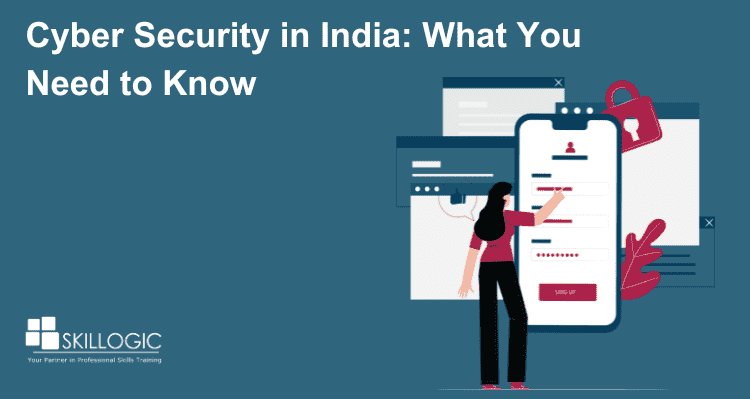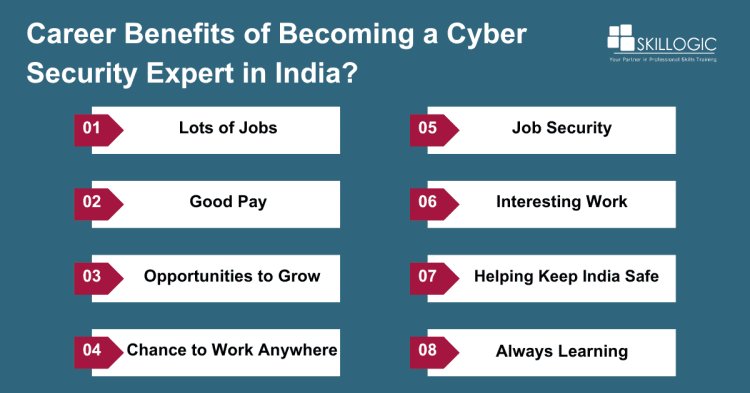Cyber Security in India: What You Need to Know

The internet has become an integral part of our lives. We use it for lots of things, like chatting with friends, shopping, or even doing work. But there are bad guys out there who try to steal our information or cause trouble online. That's why it's important to know about cyber security.
This guide is here to help you understand cyber security without all the complicated stuff. We'll talk about things like how to stay safe from cyber attacks, what you can do to protect yourself, and why it's important to be careful online.
What is Cyber Security?
Cybersecurity acts as a digital fortress shielding computers, networks, and data from unwarranted access, attacks, or harm. It encompasses a spectrum of practices, technologies, and strategies devised to uphold the confidentiality, integrity, and availability of information within the digital domain.
Think of your computer as a stronghold and cyber threats as adversaries attempting to breach its defenses. Cybersecurity mirrors fortifying your stronghold with robust locks, sophisticated alarm systems, and vigilant surveillance akin to security cameras. Similarly, in the digital realm, cybersecurity employs advanced tools such as firewalls, antivirus software, encryption, and more to thwart malicious activities.
In today's interconnected world where information traverses global networks incessantly, cybersecurity assumes paramount importance. Breaches in cybersecurity could result in dire consequences including data breaches, financial losses, and disruption of critical services. Hence, individuals, businesses, and governments alike must accord cybersecurity the utmost priority, deploying proactive measures to mitigate risks and safeguard sensitive information in the digital era.
How is Cyber Security Important in India?
Cybersecurity holds immense importance in India as the country rapidly embraces digitalization across various sectors, including finance, healthcare, education, and government services. With the proliferation of internet-connected devices and the digitization of sensitive information, the risk of cyber threats escalates significantly.
India faces a diverse range of cyber threats, including data breaches, ransomware attacks, phishing scams, and cyber-espionage. These threats not only jeopardize the security and privacy of individuals and organizations but also pose risks to national security and economic stability.
The cybersecurity industry in India is witnessing substantial growth, driven by increasing awareness of cyber threats and regulatory requirements for data protection. The projected market size of $3.5 billion by 2027 signifies the expanding opportunities in this sector. This growth is expected to fuel demand for cybersecurity professionals adept at threat detection, incident response, risk assessment, and compliance management.
Moreover, India's prominence in the global IT outsourcing market accentuates the need for robust cybersecurity measures to safeguard sensitive data and maintain trust among international clients. Strengthening cybersecurity infrastructure, fostering collaboration between government, industry, and academia, and promoting cybersecurity training in India and research are crucial steps to mitigate cyber risks and ensure a secure digital future for India.
Refer these articles:
- Why is Cyber Security Important?
- Leading Cyber Security Tool
- What is Phishing? Types of Phishing Attacks
Roles and Responsibilities of Cyber Security Professionals
- Cybersecurity Analysts: Responsible for monitoring and analyzing security incidents, conducting vulnerability assessments, and implementing security measures to protect systems and networks from cyber threats.
- Ethical Hackers/Penetration Testers: Conduct authorized simulated cyber-attacks to identify vulnerabilities in systems, networks, and applications. They help organizations understand their security posture and recommend remediation measures.
- Security Engineers: Develop, deploy, and manage security measures including firewalls, intrusion detection systems, and encryption protocols. They ensure the integrity, availability, and confidentiality of data and systems.
- Incident Responders: Respond to security incidents, investigate breaches, and mitigate the impact of cyber-attacks. They develop incident response plans, coordinate with stakeholders, and restore systems to normal operations.
- Security Architects: Design and develop comprehensive security architectures for organizations, considering factors such as business requirements, regulatory compliance, and emerging threats. They assess risks and design solutions to address them effectively.
- Security Consultants: Provide expert advice and guidance on cybersecurity strategy, risk management, and compliance to organizations. They assess security posture, develop security policies, and assist in implementing security best practices.
- Cryptographers: Design and implement cryptographic algorithms and protocols to secure data transmission, storage, and authentication. They develop encryption techniques and analyze cryptographic systems for vulnerabilities.

Career Benefits of Becoming a Cyber Security Expert in India?
Here are the career benefits of becoming a cyber security expert in India in simpler language:
- Lots of Jobs: There are many companies in India that need people to keep their computer systems safe. So, if you become a cyber security expert, you'll have lots of job options.
- Good Pay: People who are experts in cyber security can earn good money because their skills are valuable. So, you can expect to get paid well for what you do.
- Opportunities to Grow: Cyber security is always changing, which means you'll have chances to learn new things and move up in your career. You could start with a basic job and eventually become a manager or even a company executive.
- Chance to Work Anywhere: Cyber security skills are needed all around the world. So, if you become an expert, you might get the chance to work for big companies or even travel to different countries for work.
- Job Security: Since cyber security is so important, companies always need experts to protect them from hackers. That means you're less likely to lose your job compared to some other jobs.
- Interesting Work: Keeping computer systems safe from hackers is like solving a puzzle. It can be challenging, but it's also really interesting and rewarding when you figure things out.
- Helping Keep India Safe: By working in cyber security, you're helping to protect important systems and information in India from cyber attacks. It's like being a digital superhero!
- Always Learning: Cyber security is always changing, so you'll always be learning new things. This can be fun and exciting, and it'll help you stay ahead in your career.

Refer these articles:
How to Become a Cyber Security Professional?
Becoming a cyber security professional in India involves several steps:
- Get Educated: Start by earning a degree in computer science, information technology, or a related field. Some universities in India offer specialized programs in cyber security. You can also pursue online courses, certifications, and workshops to gain relevant skills and knowledge.
- Learn the Basics: Familiarize yourself with fundamental concepts of cyber security, including networking, operating systems, cryptography, and programming languages like Python and Java.
- Gain Practical Experience: Practice your skills by working on hands-on projects, participating in cyber security competitions (Capture The Flag events), or completing internships with companies or government agencies.
- Earn Certifications: Obtain industry-recognized cyber security certifications in India such as CompTIA Security+, Certified Ethical Hacker (CEH), Certified Information Systems Security Professional (CISSP), or Certified Information Security Manager (CISM) to validate your expertise and enhance your credibility.
- Specialize: Explore different areas within cyber security, such as network security, ethical hacking, incident response, risk management, or cloud security. Select a specialization that matches your interests and career aspirations.
- Stay Updated: Cyber security is a rapidly evolving field, so it's essential to stay updated with the latest trends, technologies, and threats. Follow industry blogs, attend conferences, join professional associations, and participate in online forums to stay informed.
- Build a Professional Network: Connect with other cyber security professionals, mentors, and industry experts through networking events, LinkedIn, and professional organizations like the Information Systems Security Association (ISSA) or the International Association of Cybersecurity Professionals (IACSP).
- Apply for Jobs: Start applying for entry-level cyber security positions, such as security analyst, network administrator, or junior penetration tester. Tailor your resume to highlight your relevant skills, certifications, and experience.
- Continuously Improve: Cyber security is a dynamic field, so continue to improve your skills and knowledge through ongoing learning, training, and professional development opportunities. Consider pursuing advanced degrees or higher-level certifications as you progress in your career.
How to Select the Best Cyber Security Course in India?
Choosing the best cyber security course in India requires careful consideration of several factors:
- Accreditation and Recognition: Look for cyber security courses in India offered by reputable institutions or training providers that are recognized in the cyber security industry. Accredited programs ensure quality education and are valued by employers.
- Curriculum and Course Content: Review the curriculum and course content to ensure it covers essential topics in cyber security, such as network security, cryptography, ethical hacking, incident response, and risk management. Look for courses that offer hands-on labs, case studies, and real-world projects to enhance practical skills.
- Faculty Expertise: Investigate the qualifications and experience of the instructors or faculty members delivering the course. Experienced practitioners and industry experts can provide valuable insights and practical knowledge.
- Industry Partnerships and Collaborations: Check if the cyber security training in India has partnerships or collaborations with industry organizations, companies, or government agencies. These partnerships may offer opportunities for internships, mentorship, and networking, enhancing your learning experience and career prospects.
- Certifications and Credentials: Consider cyber security program in India that prepare you for industry-recognized certifications, such as CompTIA Security+, Certified Ethical Hacker (CEH), or Certified Information Systems Security Professional (CISSP). These certifications confirm your skills and boost your employability.
- Mode of Delivery: Decide whether you prefer in-person classes, online cyber security course in India, or a blended learning approach. Choose a mode of delivery that fits your schedule, learning style, and preferences.
- Reviews and Testimonials: Read reviews and testimonials from past students or professionals who have completed the course. Their feedback can offer valuable insights into the quality of instruction, course materials, and the overall learning experience.
- Cost and Financial Aid: Evaluate the cost of the course and consider any financial aid options or scholarships available. Compare the value of the course with its cost and assess whether it aligns with your budget and career goals.
- Career Services and Support: Look for courses that offer career services, job placement assistance, or networking opportunities to help you transition into the workforce successfully. Consider the track record of the institution or training provider in placing graduates in cyber security roles.

Refer these articles:
- Cyber Security Course Fee in Hyderabad
- Cyber Security Course Fee in Chennai
- Cyber Security Course Fee in Pune
Future Scope of Cyber Security in India
The future scope of cyber security in India is promising, with significant growth opportunities driven by various factors:
- Rapid Digitization: India is undergoing rapid digitization across sectors such as finance, healthcare, education, and government services. This digital transformation increases the surface area for cyber threats, creating a growing demand for cyber security professionals to protect digital assets and infrastructure.
- Increasing Cyber Threats: As technology advances, so do cyber threats. India faces a wide range of cyber threats, including data breaches, ransomware attacks, phishing scams, and cyber-espionage. The escalating cyber threat landscape necessitates robust cyber security measures and skilled professionals to combat emerging threats effectively.
- Government Initiatives: The Indian government has recognized the importance of cyber security and has taken initiatives to strengthen the country's cyber resilience. Programs such as the National Cyber Security Policy, Cyber Swachhta Kendra, and Cyber Surakshit Bharat have been launched to enhance cyber security capabilities and promote awareness among citizens and organizations.
- Increasing Regulations: With the implementation of data protection laws such as the Personal Data Protection Bill, organizations in India are mandated to ensure the security and privacy of personal data. Compliance with regulatory requirements necessitates investments in cyber security infrastructure and expertise, driving the demand for cyber security professionals.
- Expanding Cyber Security Industry: The cyber security industry in India is experiencing rapid growth, fueled by increasing investments from both domestic and international organizations. The projected revenue in the cybersecurity market in India is anticipated to reach US$2.90 billion by 2024, with Cyber Solutions leading the market at US$1.51 billion. By 2028, the market is expected to grow at an annual rate of 13.31%, reaching a volume of US$4.78 billion. (Statista)
- Skills Shortage: Despite the growing demand for cyber security professionals, there is a shortage of skilled talent in India. This skills gap presents opportunities for individuals to pursue careers in cyber security and capitalize on the high demand for their expertise.
- Global Opportunities: Indian cyber security professionals are well-regarded globally for their skills and expertise. With the increasing global focus on cyber security, Indian professionals have opportunities to work on international projects, collaborate with global teams, and contribute to addressing global cyber security challenges.
Get trained as a cyber security pro with SKILLOGIC! Our cyber security professional+ courses in India are recognized by top organizations like IIFIS, NASSCOM FutureSkills, and CompTIA. Learn everything you need to know in an easy, hands-on way. Start your journey to a great career in cyber security with SKILLOGIC!

0
532